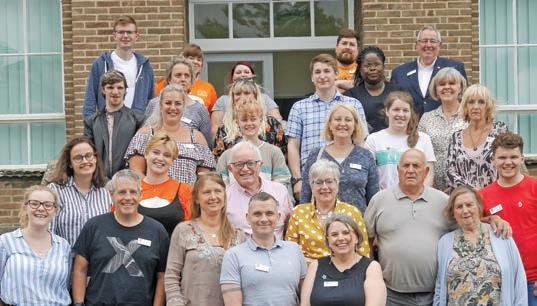
15 minute read
Reach out to everyone who needs help, support and information
Unfortunately, vaccines cannot protect everyone against all forms of meningitis, which means that Meningitis Now will continue to save lives by raising awareness of the risks of the disease, its signs and symptoms, and what people should do when it strikes. We also want to prioritise efforts to address health inequalities and promote equality, diversity and inclusion in all our work. And since many people in the UK are unfortunately unaware of the help and support we can give, we shall try harder than ever before to reach out to everyone who needs help, support and information. We do so using a range of impactful approaches and methods.
Volunteering makes all the difference
Like many in the charity sector, Meningitis Now relies on its volunteers and Community Ambassadors to reach out to people in communities across the UK. Without the ongoing support, enthusiasm and dedication of 240 volunteers and Ambassadors the work of the charity would not have been possible this year. What distinguishes a Meningitis Now volunteer is a passionate belief in the work of the charity and the part they play in making a difference every day. One of our volunteers told us:
“I am a passionate believer in what Meningitis Now is doing and about helping to spread awareness of this disease. Sometimes it can be very difficult and very emotional too, but it’s worth it. The respect that goes with volunteering helps make life feel positive.” Despite a difficult start to the year, with social distancing measures still in place, our volunteers were keen to get involved and they clocked up an impressive 868 of recorded hours. This included supporting our student awareness campaign, giving online awareness talks, distributing thousands of fridge magnets and collecting cheques. September saw the return of face-to-face volunteering activities and it was brilliant to see volunteers and Ambassadors out and about once again, especially at key events in our calendar such as the London Marathon and the Christmas Carol Concerts.
We welcomed 19 new volunteers to the Meningitis Now Family, including five volunteers who are students based in universities across the UK. Their experience and insight will help us to shape our awareness-raising activities aimed at students and young adults in the years to come. We are delighted to have them all on board. The volunteering team here at Meningitis Now know how important it is to keep in touch with our Volunteers and Ambassadors. For example, during the year they held eight virtual Ambassador reconnection sessions. This is what two of our Ambassadors said after these sessions:
“It’s like a flame has been reignited! What a difference it makes speaking one to one to Tom and everyone. I learnt a lot about the charity and what else I can do.” “The staff are fantastic, I felt so welcome. It made me feel more involved with the whole charity again and reminds me why I want to be part of Meningitis Now. It’s a great charity and I’m happy to do more.”
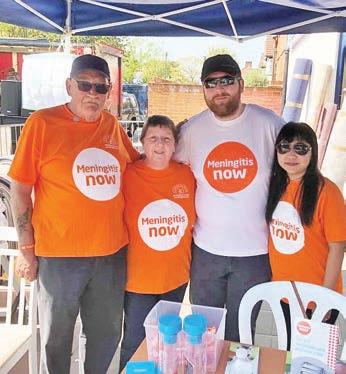
In 2016 Graeme and Gail lost their daughter Katherine to pneumococcal meningitis. Katherine’s loss was devastating and Graeme said at the time: “When we lost Katherine we had nowhere to turn for help. We were completely lost, not just within our grief but also the need for some answers. We were distraught. Some internet research took us to Meningitis Now and all I can say is thank God they were there for us.” As valued Community Ambassadors, Graeme and Gail continue to support our charity in so many ways. During the year they have raised thousands of pounds for Katherine’s Forever Fund, supported numerous fundraising events and raised awareness of meningitis by giving away thousands of symptoms cards in their local community. For this, we are extremely grateful. In December, Graeme showed great strength and resilience and delivered the key address at our London Carol Concert. He spent weeks crafting his speech, telling their story from both his and Gail’s perspectives. Graeme spoke very movingly about Katherine and the harrowing impact of her loss on him and Gail and how it never leaves them. Afterwards he said: “Writing and presenting it did so much for my mental health. It helped me get some things out of the dark corners of my mind. Giving the speech helped me so much.” Graeme is full of plans for raising awareness and funds next year, and said that being embraced in such a genuine way by the whole charity has enabled him and Gail to survive what they thought impossible. It has also given him a sense of purpose and something to focus his energy and attention on. We never take our volunteers and Ambassadors like Graeme for granted and whether they are new to Meningitis Now or an old hand – they are all valued members of the Meningitis Now Family. We know how much support they give us and in return we know how much volunteering for Meningitis Now gives them.
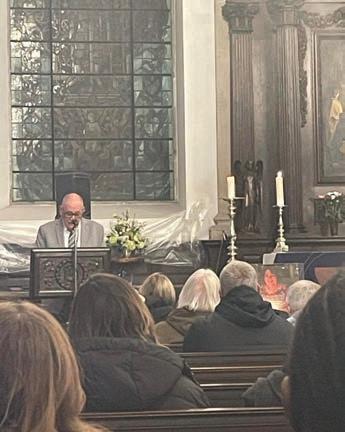
Tony and Marilyn, two of our long-term volunteers in Lincolnshire, said:
"We get an awful lot out of volunteering for you, it fills in the gap in our time in our retirement and gives us a purpose. We feel we’re using our time in a valuable and rewarding way. We really enjoy doing it and feel excited and enthusiastic about trying new ways of raising awareness. If one way doesn’t work, we just make a note and learn from it and try something else.”
Our website and social media channels are the main way we reach out to those seeking information on our work. The website was visited on average 2.2 times every minute during the year and we saw steady and strong recoveries across the board in all our metrics, after the previous year where we had seen numbers falling during the pandemic.
Website statistics
1,172,442 sessions (up 3 per cent on the previous year) 1,833,817 page views (up 1 per cent on the previous year) 992,414 user numbers (up 3 per cent) 988,295 new users numbers (up 4.5 per cent)
Social media statistics
Facebook Instagram Twitter Reach (av.) 409,729 30,235 49,335 Impressions (av.) 485,176 63,031 45,389 Engagement (av.) 23,123 1,539 702 Web visits (total) 97,097 6,214 2,235 Followers (total) 87,634 8,879 15,994
We saw strong numbers for new visitors coming to the Meningitis Now website, reaching 84.5 per cent of our total audience, up nearly 5 per cent on the previous year. These figures look likely to continue to improve based on projected metrics. We have begun to implement a total rebuild of the website which will be delivered in 2022-23 and will see a more responsive site, built with our audience in mind which will also feature enhanced donation functionality, making it easier for our supporters to give to the charity. Elsewhere, nearly 1,000 articles (928) in the traditional press and broadcast media were published naming Meningitis Now, out of a total of nearly 7,000 (6,916) items of coverage mentioning meningitis. This was an increase of nearly 400 on the previous year (550 articles) or a rise of 69 per cent. This included stories in the Daily Mail, the Mirror, the Sun, the Daily Express, the Star and Metro, as well as leading regional titles. Stories performing well included our Junior Ambassador Harmonie-Rose winning a Pride of Britain Award (and duetting with Ed Sheeran); our Celebrity Ambassadors Dean Holden and Danielle Nicholls telling their daughter’s meningitis story; recollections of Princess Diana’s involvement with the charity on what would have been her 60th birthday; and our own student awareness campaign. In addition, we published 123 news blogs on our website, highlighting everything from supporters’ fundraising efforts to our response to the latest disease incidence figures. We also published 43 case studies, covering all ages, types of meningitis and outcomes – a total of 166 stories, the majority of which fed into our social media posts, helping to raise disease awareness and promote our support offering.
Don’t assume it’s Covid or a hangover – raising awareness with students
Our student campaign this year urged young people off to university not to automatically assume they had Covid-19 or even a hangover if they felt ill – it might be meningitis. One person who knows, only too well, the consequences of making the wrong assumption about his illness was 26-year-old Londoner Nick Gilbert, who spearheaded the awareness campaign. In 2018, Nick felt under the weather, but assumed he didn’t have anything serious. After resting overnight, he went about his business the next day and even went on a date.
But, just 24 hours after first feeling ill, Nick collapsed, vomiting in a busy central London street. His symptoms were mistakenly assumed to be drunkenness by the many people who saw him. Fortunately for Nick, a young woman passer-by helped him to hospital, where his meningitis was diagnosed. Nick went on to make a good recovery. “I dread to think how the outcome could have been different if I’d just gone home and shut myself away from everybody,” Nick said. “It’s vital that anybody who feels ill does not automatically assume it’s just a hangover, or an illness you’ve just got to sweat out, like Covid.” Nick told his story across the press, including the Express Online, Wales Online and some 50 other outlets. He also joined our chief executive Dr Tom Nutt and Michelle Bresnahan, who set up the charity a Life for a Cure after losing her son Ryan, 16, to meningitis in 2010, for a series of radio interviews that proved highly successful in raising awareness. Highlights included: • Coverage on the Radio News Hub, who reach 127 member stations, including giants such as Jazz FM, Nation Radio Group and News Radio UK, and broadcast Michelle, Tom and Nick's entire interview to their combined reach of 7,900,000 listeners. • SKY News, who, as of 2021, broadcast to 34,000,000 listeners across a broad, national demographic, plus a further number of key commercial outlets. The content also reached major London stations including Capital FM, LBC and Heart Radio. The total items of coverage numbered 140, with a listener reach of 42,705,000 and total airtime exceeding 22 hours. Most of the interviews lasted well in excess of seven minutes – and some over ten minutes – giving Michelle, Tom and Nick ample opportunity to share their stories and advice.
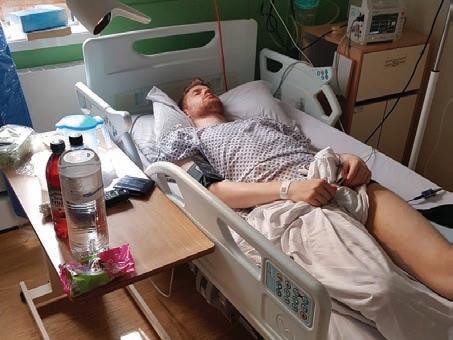
There was positive feedback from presenters too: “Thanks Michelle, Tom and Nick – a very important interview. Clearly explained and full of detail” Jools Oughtibridge, Content Producer, Radio News Hub “It was a pleasure to talk with Michelle, Tom and Nick – a very moving and useful interview for students and parents alike.” David Caldwell, Presenter and Producer, Sescot Radio “Great interview – really useful and important information, and perfect for our listeners.” Pete Finch, Presenter, BRFM
• Since social distancing measures have been relaxed in the UK, cases of meningitis are starting to rise again, especially among young people, but they are still below pre-Covid levels.
• In England, overall Invasive Meningococcal Disease (IMD) incidence in 2020 to 2021 has declined at below 1 per 100,000 of the population* • MenB was responsible for the majority of IMD cases in individuals across all age groups • In late 2021 there was a sharp increase (exceeding pre-pandemic levels) in MenB cases among adolescents and young adults in England, particularly in university students.
Low immunity against group B strains and high transmission of meningococci among adolescents/young adults resulted in the return of group B disease. This was a cause for concern.
• The true impact of meningitis is not measured by incidence alone and we know that the disease continues to have a profound impact on the lives of those who experience it. *2020-2021 refers to the epidemiological year July-June
Making more people aware of our support
We have worked determinedly this year to promote our aftercare and support services with the aim of ensuring that they are accessible to all. Whilst we know that we still have some way to go to reach people affected by the disease in diverse communities across the UK, we are making significant progress. Throughout the year we provided emotional, practical Support after and financial support to 172 new people from across meningitis the lifespan. This is a noteworthy achievement Meningitis Now know how tough life after given the continued impact of Covid-19 and the low meningitis can be. numbers contracting the disease. This number doesn’t We provide emotional, practical and financial support for people of include the numerous people who have joined our all ages in the UK who have been affected online peer pages and contacted our Helpline for the by meningitis. first time. We will continue to focus on promoting our “Meningitis Now’s support has been invaluable for my family. I information and support services more widely in the years to come. often wonder how I would have coped without their support. ” As part of the launch of our Strategic Plan in April 2021, we produced a series of videos, one of which focused on our Young Ambassador Louise Greer and the impact that her involvement with Meningitis Now, and in particular with our support services, has had on her. Louise, who had meningitis when she was two-and-a-half, leading to amputations of both legs through the knee, part of her left arm and part of the fingers on her right hand, talks movingly about her involvement with the charity. “If I hadn’t had the support of Meningitis Now I would probably have stayed quite shut in the house and not gone out, not gone to uni and not gone on to look for jobs that are probably quite ambitious. I learnt that I have a lot more skills than I thought I had. It’s enabled me to be more confident in myself and independent.” On Facebook the video has had 875 views and 84 reactions. On Twitter, it’s had 40 views and seven reactions. You can watch the video here https://youtu.be/bs6Qgj5Mjic

We are committed to EDI as an organisational priority for 2022-5 and to embed it into the way we think, relate and work. We invested significant resources this year by appointing an operational lead for EDI, who will undergo a Chartered Management Institute (CMI) level 7 EDI qualification. We have also engaged an external consultant to help us develop a clear plan for EDI across our support services and the charity’s wider team of staff and volunteers. The EDI plan for next year will involve laying the groundwork for the more detailed roll out of EDI in the years to come. In the first year, the work will include: • External consultancy to pinpoint key areas where we have gaps in data. • Delivering EDI awareness training for all staff through our e-learning platform and workshops delivered by an EDI specialist. • A staff and supporter survey to gather qualitative data and gain insights. • A review of our Equal Opportunities Policy based on learnings from training and review of our practices. • Finalising and publishing a commitment/vision statement for EDI. • Developing a detailed three-year EDI strategy. • Ensuring that EDI is fully embedded in our culture and the way we work, as well as for the wider Meningitis Now family.
Providing the right information
Nurse-led Helpline still a lifeline for many Our nurse-led helpline remains at the core of our information and support provision and is a lifeline for many. Despite a few challenges in resourcing the Helpline during opening hours this year, we have provided information and support to numerous people from across the UK (see below). Our team of Nurses, supported by a Community Support Officer, have provided muchneeded listening support via calls, emails and social media. Following the reduction in Helpline contacts that we saw last year (1,828) at the height of the pandemic, we correctly predicted that numbers would remain reasonably static this year (1,710). This is not surprising as the impact of Covid-19 was still being felt, particularly during the first six months of the year. Contacting the Helpline via email remains the most popular route and often results in lengthy and complex responses. This continues to reflect people’s use of digital platforms to access information and support services. One thankful person who emailed us wrote:
“Thank you for getting back to me so quickly. The thought that there is someone out there that actually understands what you are talking about and can offer real help and understanding is such a relief. Many and sincere thanks.”
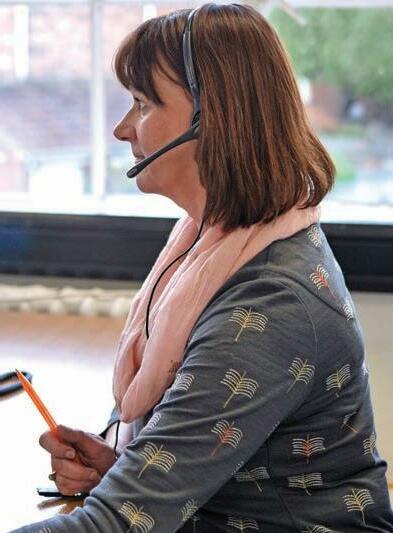
We continue to receive many calls that cover a range of topics including vaccination, signs and symptoms, hospital treatment, after-effects and bereavement. Recovery and after-effects and service enquiries continue to make up the largest proportion of the calls. It is worth noting that these types of calls take significantly longer (upwards of 30 minutes) than calls about symptoms or risk. To demonstrate how we make a difference every day on the Helpline, we monitor the impact using a post-call survey. All respondents found the information they received useful and felt more confident in dealing with the issues raised during the call. Feedback from callers also shows us that we are getting it right and our Helpline continues to have a crucial part to play in our service delivery:

We would like to thank the James Tudor Foundation for continuing to fund our Helpline and the expertise of our nurses.







